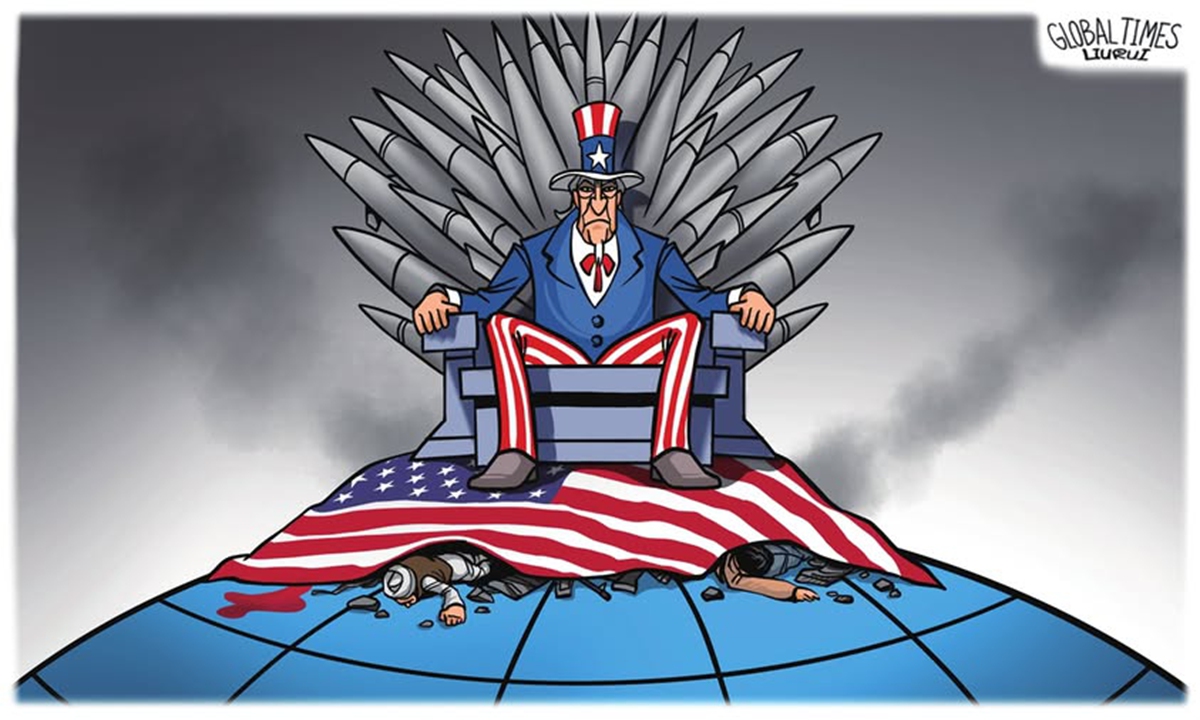Dec 01, 2024, 18:12

Illustration: Liu Rui/GT
(Global Times) As the first Virginia-class nuclear attack submarine, USS Minnesota, deployed to Guam, arrived on Tuesday local time, the US Navy issued a press release referring to Guam's nuclear attack submarines as "the tip of the spear." The statement claimed that this deployment is part of the US Navy's strategic laydown plan for naval forces in the Indo-Pacific region, emphasizing that the security environment in the region requires that the US Navy station the most capable units forward. The release also mentioned promoting "a peaceful and prosperous Indo-Pacific region." While the US military continually stabs at the peace and stability of the region with its "tip of the spear," it simultaneously talks about promoting Indo-Pacific peace and prosperity. This double standard is truly ironic.
This is not the first time US nuclear submarines have been deployed to Guam, but it does mark a clear military buildup. In terms of numbers, before November 2021, only two attack nuclear submarines had been deployed to Guam. With the arrival of Minnesota, the total number reaches five. In terms of capability, the previous submarines stationed at Guam were Los Angeles-class attack nuclear submarines, while this deployment upgrades to the fourth-generation Virginia-class. The other four nuclear submarines in Guam will also be replaced by Virginia-class submarines once they retire. Some media have claimed that these deployments bring the "tip of the spear" significantly closer to China, reducing the distance by thousands of kilometers.
Deployment of the Minnesota further confirms that the US plans to turn Guam into a "weapon" piercing regional peace and stability. In recent years, the US Department of Defense has put over $1 billion annually to enhance Guam's military readiness, with some saying that the US aims to turn it into a so-called "unsinkable aircraft carrier" on the "second island chain." What's even more noteworthy is that this military buildup carries a strong sense of targeting a hypothetical enemy and preparing for actual combat, making it one of the direct triggers for escalating regional tensions.
In recent years, the US has been vigorously promoting its so-called "Indo-Pacific Strategy" in the Asia-Pacific region. By strengthening the "Five Eyes Alliance," advancing the "Quad mechanism," assembling various exclusionary "small cliques," and frequently conducting military exercises aimed at China, the US attempts to fragment the Asia-Pacific into several mutually defensive blocs. In April, the US Congress passed a $95 billion supplemental military aid and expenditure bill, with $8.1 billion earmarked for countering China in the Asia-Pacific. It can be said that the US has gone to great lengths in pursuing its "Indo-Pacific Strategy."
The deployment of Minnesota exposes the hypocrisy of the US' so-called "managing differences with China" narrative. It demonstrates that Washington's true intention is to compel China to fully accept its coercion and suppression without any response, thereby reducing the risks and costs of its provocative actions. At the same time, the US aims to bolster its military deployments to convince its allies that following US' provocations and containment of China poses no risks, thereby accelerating the process of NATO's Asia-Pacificization. However, China will not indulge Washington's reckless behavior on this issue, precisely because China is committed to upholding and safeguarding regional peace.
Washington seems to have become somewhat obsessive in its fixation on "containing China," to the point where it has trapped itself in a vicious cycle of "only escalation, never de-escalation." This dynamic is placing an increasingly heavy strategic burden on the US, and many within the country are already aware of this. Over the years, the rhetoric used by the US to pressure China has undergone multiple shifts - from "decoupling" to "de-risking," and now to "responsibly managing differences" - revealing that Washington is well aware of the prevailing sentiments in the international community. The strong regional desire for peace and stability clearly makes it uneasy. Yet, driven by the inertia of "political correctness," it is heading in an increasingly dangerous direction without control.
In recent years, the relationship between China and the US, including their military ties, has experienced ups and downs, yet dialogue and cooperation have taken place, achieving a general state of stability. However, this hard-won stability remains fragile and requires significant effort from both sides to maintain and strengthen. China harbors no strategic hostility toward the US and hopes that it will meet China halfway, refraining from unconstructive actions such as deploying weapons here and establishing bases there. Instead, the US should focus on initiatives that are genuinely needed and welcomed in the region, embodying the responsibility and demeanor expected of a major power.
Community login







Add a comment